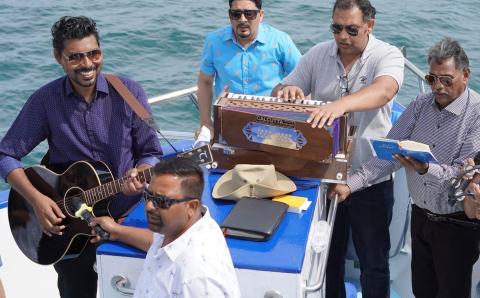Forty years ago, I was ordained as a minister of the Word and sacraments. It was the last hurdle on a journey that began when I was 16. In ways I cannot explain, God impressed on my introspective young heart a passion for service and mission. It led me stumbling through college, trying to find a major that would get me to seminary. It took me on a roller coaster of faith when I found seminary to be anything but a spiritual retreat. It brought me to an unwanted but transformative internship where a supervising pastor I did not at first respect helped me find Jesus and ministry.
Now came the time for the “laying on of hands.” This dark night, from widely scattered Alberta prairie towns and local farms, people gathered at a rustic unmarked church building to sit on uncomfortable hand-built benches, promising to pin their prayers on this young stranger whom they all, by the audacity of hope, believed Jesus had called to this ministry at this time.
Initially, as a single man in my mid-20s, I did a lot of pastoral visitation over meals at farmhouse tables, often inviting myself to join families too timid otherwise to have the “domine” come over. Sundays were the big days, of course. I stood outside the small entrance of this windswept building to welcome people, trying to remember names and birthdays and anniversaries. I prepared one modestly decent sermon each week for the morning worship gathering, then beat a hasty retreat home to try to pull together another new sermon for the afternoon service. Most of the year, worship services were at 10:30 a.m. and 2:30 p.m., sandwiched between early milking, noon irrigation pipe moves, and afternoon milking.
Baptisms were overflow celebrations with extended family pouring in from everywhere. One Sunday we baptized the entire family of refugees we had sponsored. It was Dutch immigrants taking care of Cambodian immigrants. There was not a dry eye in the place when I read from Hebrews 11: “They… admitt(ed) that they were foreigners and strangers on earth. People who say such things show that they are looking for a country of their own. If they had been thinking of the country they had left, they would have had opportunity to return. Instead, they were longing for a better country—a heavenly one. Therefore God is not ashamed to be called their God, for he has prepared a city for them.”
I look back with amazement at these four decades and find that I am still traveling, living often as a foreigner and stranger. I met Brenda two months after my ordination. The congregation spied on us through our long courtship, and then celebrated extravagantly at our Easter wedding and reception. Shortly before the event, one of our farmers shouted down at me from his high tractor-seat perch, “Now you are counting down to the wedding. Then you will count up to nine and the baby!” I scoffed, but it was true. Kristyn came along nine months later.
When our second daughter was born, our elder read the baptismal form before I sprinkled the water. He grinned at me and ad-libbed, “Pastor, I know you were looking for a boy, and here’s a girl instead. But be patient, be patient.” Everyone laughed uproariously.
But the boy never came for us. Our third daughter was born in Nigeria when I was serving there as a missionary. In these 40 years we have lived in four countries on several continents, called a dozen villages and cities home, and taken up quarters in 14 different houses. I have preached in church buildings of all shapes and sizes. While these gatherings were invariably friendly and inspiring, the only person I truly remember always being there was Jesus.
Many of those to whom I first served communion have since joined the eternal feast of saints. Now and again a baby I baptized shows up as a student in one of my college or seminary classes. One couple (then unconnected to any church) that asked me decades ago to officiate at their wedding continues to send newsy Christmas cards documenting their growing family and deepening Christian faith, which they attribute to my first interactions with them. But many other marriages have ended in divorce despite my best pastoral counseling and prayers.
Funerals were the best and worst. I have cried many tears of reflective joy when listening to the family tributes paid to true saints. But too many times there was bitterness. One young evangelist brought his friend from the overnight assembly line to worship. Both were married with young children, and soon the two boisterous families occupied one long line of chairs up front in our “contemporary” worship service. The visitor came to talk with me, saying he’d never been “religious” or had a “priest.” We had a great conversation and together formed a plan for instruction leading to baptism and membership.
But a week later everything changed. The excited new believer was hopping mad. His older brother, wild and impetuous, had been at a party where drinks and drugs and guns tumbled every which way. However it happened, his brother was dead of a bullet through the brain. First, he needed someone to “do” the funeral. Since I was the only “priest” he knew, he asked me to take care of it. But second, he needed justice. And that is where things got really strange. He and his brother were part of a recent and often-despised immigrant community. The killer was not only white, but a brother to several women in our congregation, including the mother of a family whose favored seats during worship had been taken over, unwittingly, by this newcomer and his wild kids! On Sunday the visitor asked for prayers seeking justice for his cruelly terminated brother while the sister of the man who pulled the trigger sat stewing directly behind him.
At the cemetery, as the casket was being lowered into the earth, my new friend jumped down onto it, spread-eagled, pounding his fist on the metal casing and wailing, “NO! NO! NO! You can’t be gone! I’ll get justice for you!”
This scene and others like it haunt me. I remember the passion of my early love for Jesus, and the ordination that confirmed my leadership role in ministry. Jesus and I were going to change the world. Now, as I begin to think about “retirement,” I sometimes wonder what these four decades have meant. I look with kindness and hope at my students, apologizing to them for the world we know, with its horrible racialization, constant wars, inequities hinged on privilege, famine, and skepticism. “I tried,” I tell them. We tried. Those who have intertwined with my life these 40 years have tried.
But we have failed. I gesture “giving hands” to my students and say, with love and genuine expectation, “I’m sorry. I tried. I did what I could. We’ve left it a mess, but here it is. Make it better.”
In a sense, it is another laying on of hands. Jesus has not failed, and I am thankful for the energizing Holy Spirit that came to me through my ordination. But now I pass it along to others.
And I live in hope.
Discussion Questions
-
Who were some ministers of the Word of whom you have fond memories? Why did they stand out for you?
-
When you look back over your life, what are some events that stick in your mind as significant? What insights did you gain from them?
-
If you were speaking to the next generation, what issues would you say you have tried to address that they can try to make even better?
-
Should the church community find ways to “lay hands” on nonclergy Christians as a way to encourage, empower, and equip them for their own Christian service in the world? Why or why not? If so, how might they do that?
About the Author
Wayne Brouwer is a Christian Reformed pastor who teaches at Hope College and Western Seminary, both in Holland, Mich. His latest books are Martyr's Manual and Splitting the Day of the Lord.








